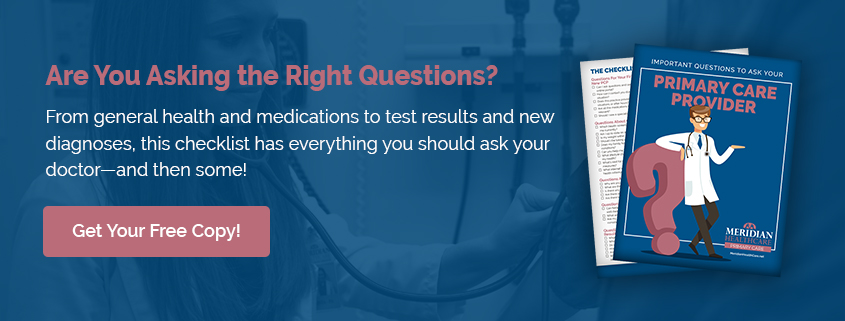Keys To a Healthy Doctor-Patient Relationship
Strong relationships are made up of equal parts trust and communication. And, those same elements are required to create a good relationship with your primary care doctor, too.
It’s important to make sure that you’re receiving quality care and that your doctor is getting the information they need from you. By building a healthy relationship with your doctor, you’re not only getting better care and improving your well-being, but also making the most of the time spent at your doctor visits. Here’s how to build the best possible relationship with your doctor:
1. Ask Questions About Your Concerns
Prepare for your primary care physician visit by making a list of healthcare questions, and bring the list with you so that you don’t forget to ask something when you arrive at the doctor’s office. Make a note of any new health issues that have appeared or any symptoms you’re experiencing.
Speak to your doctor if you’re having unusual or uncomfortable side effects from medications — for example, if two medications are conflicting, your doctor may have to adjust your dosages. If you’re visiting a new doctor, bring your current prescription bottles with you for the provider to review, because he or she may not have information from other specialists or previous physicians readily available.
2. Be Honest and Open
To fully understand your health and wellness, your doctor will ask you questions. Be honest and open with your doctor to ensure that you get the care you need. This includes informing your doctor about over-the-counter medications or nutritional supplements you use regularly.
Your doctor needs to know what’s going on in your life, so don’t be afraid to share your feelings and opinions. If there’s something that worries you about your health or treatment plan, have a conversation with your doctor to review concerns and get a better understanding on treatment.
It’s important for doctors and patients to work together as partners in order for each person’s needs to be met so that, ultimately, you can improve your medical care and achieve better health.
Your Family’s Medical History
Your family’s medical history is very important. If you have a family member with a medical condition, let your doctor know so they can be on the lookout for signs of the same illness in you.
Certain diseases tend to run in families. If there is a history of heart disease, high blood pressure, or cancer in your family, for example, there may be certain tests that are recommended for you to get done at specific intervals (such as annual blood work).
3. Take Good Notes
Medical information can be very confusing, especially if you’re dealing with a new condition or diagnosis. Don’t hesitate to ask the doctor to repeat something.
Take notes during your visit while the information is still fresh – if you wait until you get home, you may forget something and will have to spend time calling the doctor’s office to figure out what it was. Taking notes is especially important for elderly patients. If you need to, bring along a family member to take notes for you.
4. Understand Your Doctor’s Instructions
You and your doctor are a healthcare team. Together you make decisions about treatment options that are right for you. However, it’s up to you to make sure that you completely understand your doctor’s instructions before you leave the office. You need to be aware of certain things:
- Follow-Up Appointments: Will there be a follow-up appointment, and if so, how soon is it? Are you able to schedule the appointment now to ensure that it’s at a time that’s most convenient for you?
- Tests: Will there be any lab tests required after this visit? Can these tests be performed at the doctor’s office or will you have to visit another medical center?
- Prescriptions: Has your doctor ordered new prescriptions for you to pick up? Do you need any additional information about these new medications?
- Referrals: Has your doctor made a referral to a specialist to take a closer look at one of your medical conditions?
Taking the extra time to gather all of this information before you leave your appointment will save you time later on.
5. Take Advantage of the Patient Portal
Many healthcare providers offer a patient portal where patients can securely access their information and health records. Doctors also update your medical records with test or lab results for your review prior to discussion at your follow-up appointment.
A patient portal is an easy way to keep all of your healthcare information organized and in one place. Keeping a hard copy of everything can get confusing and hard to manage, especially when there’s one specific record that you need to find.
Follow These Tips to Strengthen Your Relationship With Your Doctor
These simple steps are a great guide to building a trusted relationship with your primary care doctor. Remember to take an active role in the decision-making process for your healthcare; your doctor has extensive training and medical knowledge, but ultimately, you’re the one who has to manage the treatment he or she recommends.
If you feel that your doctor isn’t listening to you, is difficult to get hold of, or you feel as if he or she isn’t taking your health seriously, then it’s time to reevaluate the relationship. It’s your right to switch primary care providers and work with a doctor who makes your health a priority. The primary care team at Meridian HealthCare understands that every patient should be treated with dignity and respect – contact us today to make an appointment with one of our primary care doctors.






